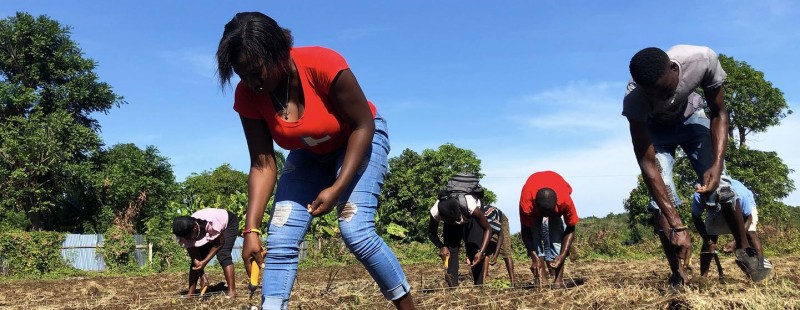Members of a farming association in Jérémie plant black beans. Farmers in south-west of Haiti are cultivating a future for the country as they continue to work their land despite the challenges caused by the 14 August earthquake. The UN’s Food and Agriculture Organization’s (FAO) has been supporting their development over many years as FAO’s Jérémie-based staff member Mykerlange Balmir explains. “The earthquake which struck south-west Haiti in August impacted mostly rural populations, and obviously farmers were affected a lot. Many lost their houses as well as their grain and seed stores which collapsed in the tremor; the land of some farmers was also damaged due to landslides. In some cases, fissures could be seen as the ground opened up. FAO has supporting farmers in Jérémie long before the earthquake, but our work here is now as important as ever. Farming has always been extremely important in the fabric of Haitian society. FAO’s Myklerange Balmir, outside the town of Jérémie. The bridge out of the town was damaged and so trucks can no longer pass, so it’s become very difficult for farmers to sell their produce in big markets like the capital, Port-au-Prince. Their grains and vegetables have to be literally carried over the bridge on foot if they want to export them. Then there is the security situation in Port-au-Prince, where roads in and out are blocked, so even if trucks can get out of Jérémie, the goods may not reach the city. So, a lot of food has been wasted as it’s impossible to sell to the consumers in other parts of the country. As a result, many farmers have lost money and are now more vulnerable than before. And any goods which come into Jérémie from elsewhere are more expensive, so the cost of living is going up for all people. In Jérémie, we’re encouraging the local production of food for local consumption as well as the growing of seeds. The bridge into Jérémie is closed to vehicles after it was damaged in the earthquake. We support a women’s farming cooperative, a group of 63 women who work the land together to bring in a harvest of a variety of organic vegetables. It’s at the beginning of the season and today they are planting tomatoes and hot peppers which will grow alongside cabbages. They share the harvest, eat what they need and then sell the rest in the town where they can get good prices. You can watch the women walking across the bridge with the produce stacked high in baskets on their heads. They don’t need to spend money on transport. And any money they save can be invested in the savings credit union which FAO helped them to set up. Farming association member, Pierre Ybert, works alongside other members planting black bean seeds. FAO has also trained a 120-strong association of farmers in Jérémie to grow good-quality organic seeds for their own use and also for distribution to other vulnerable farmers, many of whom lost their stocks in the earthquake. Producing seeds is a very technical process, so these farmers have become specialists. This season they are planting black beans, but they are also skilled at growing maize, manioc, and potato. FAO will buy the majority of the seeds and so the hard work of one farming community will benefit others, and especially vulnerable communities. This approach is building resilience and helps farmers to recover when a natural disaster like an earthquake strikes. This area has also had it’s share of hurricanes and droughts, so it’s important farmers are well prepared. I love working with farmers; they are always committed to their land. They work hard and fight on despite many setbacks. They believe in the future of Haiti and I am proud to support them as they continue to develop.
The bridge

Women’s co-op

Organic seeds
The World Organization for Development has been endowed with consultative status with the UN ECOSOC since 2014. The World Organization for Development, which has consultative status wich the UN ECOSOC, develops and implements Global Initiatives to achieve the UN Sustainable Development Goals.




Comments are closed.